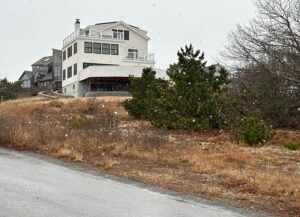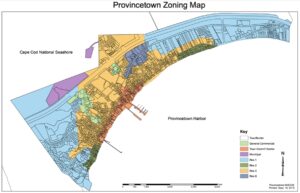PROVINCETOWN — The select board is enthusiastic about two zoning amendments that it wants to bring to town meeting voters this spring — one that would “upzone” the town’s zoning map and allow two- and three-family homes in more places, and another that would give priority development rights to new units that would be year-round rentals or the primary residences of owner-occupants.

“I think we have enough mega-mansions in Provincetown,” said select board member Austin Miller, who wrote the amendments, at the select board’s Jan. 23 meeting.
“In certain districts in town, including the Res-1 district, that’s all you’re allowed to build anymore,” Miller said, referring to the Residential-1 district that encompasses the town’s eastern and western edges.
Miller’s first amendment would change the “permitted principal use” table in the bylaw to allow two-family homes to be built by right in the Residential-1 district, where they are currently forbidden, and in the Residential-2 district, where they are currently allowed but only with a special permit from the planning board.
Miller’s amendment would also allow three- and four-family dwellings by right in the Residential-2 district, where they are currently forbidden, and allow four-family dwellings by right in the Residential-3 district, where they are currently allowed by special permit.
A second zoning amendment proposed by Miller would allow the town to offer its “growth management gallons” — allocations of the town’s limited freshwater resources — specifically to new year-round rentals or owner-occupied primary residences.
The town’s growth management bylaw, adopted in 1989, attempts to organize the town’s future development in relation to its freshwater infrastructure. Affordable housing projects have long received priority access to “growth management gallons,” followed by inclusionary housing projects and accessory dwelling units.
Miller’s proposed amendment would add newly created year-round rental units and owner-occupied primary residences to that second-priority category.
To receive access to those gallons, builders would have to accept a 10-year use restriction on the new units, with fines of $55 per day (about $20,000 per year) if the units were not either year-round rentals or primary residences.
“These are meant to be complementary,” Miller said of his two proposals. “Through the growth management change, we can further encourage the type of development we’re looking for without the necessity of a deed restriction.
“If this is the only allowable use for the first 10 years, it would have some effect on the asking price but also on residents being able to actually bid on and win that property,” Miller said. “In lieu of price controls, which we can’t do, and controlling who gets to buy properties in town, which we can’t do, this is the next best thing we have.”
Select board member Leslie Sandberg and chair Dave Abramson said they supported the amendments, while member Erik Borg said he wanted to “upzone” the Residential-1 district even further.
The board did not vote directly on Miller’s amendments, however.
Instead, according to the protocol for zoning bylaw amendments that will go to town meeting, the board referred them to the planning board for review.
Questions Without Answers
The planning board had numerous questions at its meeting two days later — but Miller was not there to answer them.

Town Manager Alex Morse had suggested Miller attend and answer questions, but Abramson said it would not be proper for one member to speak for the whole select board.
Instead, Abramson asked Town Planner Thaddeus Soulé to explain the select board’s “discussion and intent” to the planning board.
Soulé told the planning board about his own objections to Miller’s proposals, but he did little to explain the select board’s thinking.
“From my perspective as the town planner, it’s not zoning that’s holding back growth of housing, it’s our limited capacity in terms of sewer,” Soulé told the planning board. “And of course, the economics — the demand right now, the highest and best use, is a single-family home.”
Planning board member Michael Gaucher asked repeatedly how the upzoning amendment could create year-round rental units — but Soulé did not relay Miller’s argument that the change to growth management could steer newly built units in that direction.
After almost an hour spent trying to guess at the select board’s intentions, the planning board gave up and decided to ask for a discussion of the amendments at the next housing workshop.
“I would like to hear from the select board directly as to why they think this is a good idea, because I don’t know if we’ve heard that,” said planning board member Jeff Mulliken. “We see what they’re proposing, but I want to hear more about it before we make a decision.”
The Road Ahead
Upzoning was discussed at several housing workshops last year, but the town’s growth management bylaw is rarely on the agenda.
“Our current zoning code is making Provincetown more expensive,” Miller told the Independent. “If you allow a four-bedroom single-family home but not two two-bedroom duplex units, then you’re requiring mansions and making housing even more expensive than market forces like the cost of construction have already made it.
“If you allow these smaller units, they may still be somewhat expensive,” Miller said, “but if you then only make them available for purchase as a year-round rental or primary residence, then those buyers would not have to compete with vacation and second-home owners who have the ability to outbid them with cash.”
Getting prices down even further than that would likely require subsidies from the town, probably in exchange for longer-term use restrictions or deed restrictions, Miller said. “This particular program doesn’t require a subsidy,” Miller said. “It’s just one tool in the toolbox.”
Using the growth management bylaw to steer new duplex or triplex developments into the hands of year-round residents is somewhat ironic, given that the bylaw currently rates single-family homes as a higher priority than two-family homes.
“There was an understanding of environmentalism that said you limit development so everyone is in single-family homes — and spending two hours a day in cars,” Miller said. “It’s important to reexamine that, because it actually spread people out across a larger environmental footprint.”



